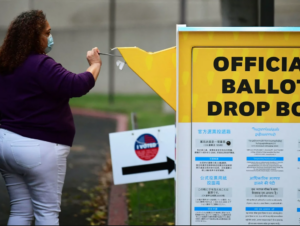Why aren’t more moms running for office? One group is hoping to change that
“Who will watch your kids while you campaign?”
It’s a question Liuba Grechen Shirley says she repeatedly got when she ran for a New York congressional seat in 2018. At the time, she was a mother of two young children.
“Men don’t get asked that question. Men are praised if they bring their children with them,” Grechen Shirley said. “But when a woman shows up with her child, she’s immediately looked at as somebody who is not fully dedicated to the cause, and who does not have the time to run.”
She lost in the general election to Peter King in 2018, but found a new mission. In the years since that race, Grechen Shirley created Vote Mama Foundation and the Vote Mama PAC, organizations dedicated to getting mothers, specifically Democrats, elected to public office.
“It’s critical that we are also teaching our children that running for office is just what moms do, that they should be civically engaged, that it’s fun, and that it’s easy,” Grechen Shirley said.
It’s a message that’s hard to get into the minds of women even now in 2022. This year, there are a record number of women who are nominees in races for governor and state legislatures, according to the Center for American Women and Politics at Rutgers University.
Women — even more so those with young children — are still in the minority, Vote Mama’s research shows. This is despite the proven political power of mothers, University of Virginia a politics professor Jennifer Lawless said.
Only 5.3% of all state legislators across the country are women with children under the age of 18 at home, according to Vote Mama. And only 7% of members of Congress are moms of minor children. In comparison, nearly 18% of people in the U.S. are mothers with kids under 18.
The political power of moms
Mothers, though not a monolith, have the power to sway elections, Lawless said. Over the years women have notably used the “mom” moniker to their advantage.
For example, Sarah Palin coined the phrase “hockey moms” in 2008, which fired up a certain demographic, Lawless notes. When U.S. Sen. Patty Murray got into politics she used “just a mom in tennis shoes” to her advantage.
“That sort of made a lot of women who had children, who hadn’t necessarily thought of themselves as politically active, interested in running,” Lawless said of Murray.
Research shows that women have voted at higher rates than men in every midterm and presidential election since 1984.
“If you look back at election cycles, over the last few decades, it’s often been these suburban women who are pivotal in terms of either delivering a victory to the Democrats or the Republicans. So it’s not unusual to try and get them to be politically involved, because it could potentially help each side. It depends what issues are on the agenda,” Lawless said of Vote Mama’s effort.
Grechen Shirley says she wants to use this political power to get mothers volunteering for local elections, to work with campaigns, and to advocate for family friendly policy change in Washington. To make that happen, the organization expanded this year to establish Vote Mama Lobby.
This works as the advocacy arm of the Vote Mama Foundation. With its website and app, it aims to connect members to mobilize in local, state and federal races. The goal is to get 100,000 members to help elect Democrats and Vote Mama PAC-endorsed candidates by the 2024 election cycle.
